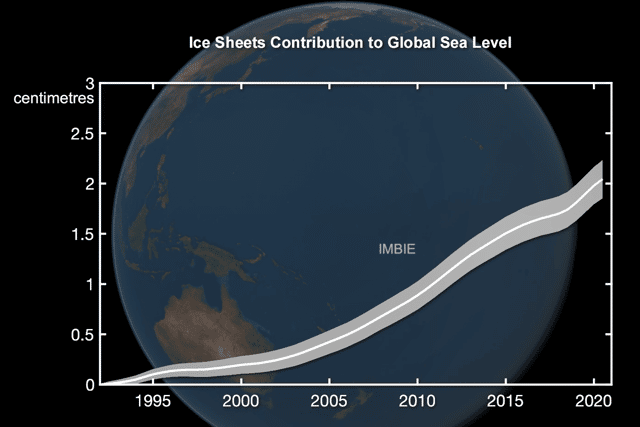Accelerating melt of Earth’s ice sheets causing sea levels to rise as expert warns ‘we should be worried’
and live on Freeview channel 276
The accelerating melt of Earth’s ice sheets is causing sea levels to rise faster and “everyone should be worried”, a scientist has warned.
Dr Inès Otosaka from the University of Leeds told NationalWorld in the early 1990s the melting of ice sheets in Greenland and Antarctica accounted for around 5% of the total sea level rise but it is now accounting for five times the amount at 25%.
Advertisement
Hide AdAdvertisement
Hide AdAn international group of scientists, including Dr Otosaka, who work with satellite data, said the acceleration in the melting of Earth’s ice sheets is now unmistakable - and seven of the worst melting years have occurred in the past decade.
In the study they calculated the planet’s frozen poles lost 7,560 billion tonnes in mass between 1992 and 2022 which pushed up sea levels by 21mm.
If you could shape an ice cube out of all the ice losses from Greenland and Antarctica over the past three decades it would stand 20km high.
Dr Otosaka said “everyone should be worried” as rising sea levels “will impact a very large proportion of the world as around 40% of the world population live in coastal areas.”


Advertisement
Hide AdAdvertisement
Hide AdShe added that the UK “will be impacted” and will need to implement “adaptation and mitigation policies to account for higher risk of flooding, for instance plan for more frequent storm surges in some places.”
The latest assessment comes from the Ice Sheet Mass Balance Intercomparison Exercise (Imbie) - a project supported by the US and European space agencies that issues regular reviews of the state of the planet’s ice sheets.
The research found the worst year of melting was in 2019 when the ice sheets lost a combined 612 billion tonnes. Around 444 billion tonnes of this ice was lost as a result of an exceptional heat wave in the Arctic during its summer.
Sea-level rise is driven by several factors, including the thermal expansion of water in a hotter world, the run-off of meltwaters from glaciers outside the ice sheets, and changes in the amount of water held on the continents.
Advertisement
Hide AdAdvertisement
Hide AdProfessor Andrew Shepherd, from Northumbria University and the founder of Imbie, told BBC News that the accelerating ice sheet losses means “we’re looking in the next decade at a marked rise in the rate of sea-level rise.”
He added: "In past decades, it’s been about 3mm a year. Soon, we will see 4mm, 5mm, 6mm per year; and this will be a big psychological change from what we’ve been used to."
Dr Otosaka said there needs to be “strong governmental policies to limit future warming”, adding: “We know that if we exceed certain warming thresholds, some important, and possibly irreversible, feedback mechanisms could be triggered, which would lead to even higher sea levels so we need to act now to avoid this kind of situation”.
Comment Guidelines
National World encourages reader discussion on our stories. User feedback, insights and back-and-forth exchanges add a rich layer of context to reporting. Please review our Community Guidelines before commenting.
